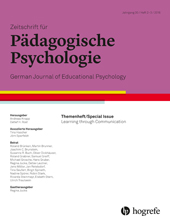Abstract
Zusammenfassung. Dieser Kommentar befasst sich mit den vielen unterschiedlichen und interessanten Artikeln des Themenhefts. Zuerst wird überblicksartig eine Zusammenschau der Befunde mit Blick auf neue Erkenntnisse gegeben. Dabei werden Aspekte von Argumentation und Lernen kritisiert, um die Wichtigkeit dieser Erkenntnisse für die weiterführende Forschung in diesem Bereich herauszustellen. Anschließend wird kurz ein neues Bezugssystem für epistemische Kognition beschrieben und als Linse verwendet, um einige Themen der Artikel genauer zu beleuchten. Dies hat das Ziel, neue Denkweisen in Bezug auf Argumentation und das Erlernen und Vermitteln dieser zentralen Praxis zu eröffnen.
Abstract. This commentary addresses the diverse and stimulating articles included in this special issue (Jucks & Mayweg-Paus, 2016). We begin by discussing the overall landscape of this compilation in terms of the network of new findings described and offer a friendly critique regarding aspects of argumentation and learning to argue that could be productively extended in future research. We then briefly describe a novel framework for epistemic cognition and use it as a lens to examine a handful of common themes found in the articles. Our aim is to offer a new perspective to thinking about argumentation and a new direction for studying the learning and teaching of this central practice, extending the exciting new approaches taken in these articles.
References
(2010). A learning progression for scientific argumentation: Understanding student work and designing supportive instructional contexts. Science Education, 94 , 765–793.
(2016). Identifying general abilities: Identifying general cognitive abilities involved in argument comprehension and evaluation. German Journal of Educational Psychology , 30 (2–3), 79–95.
(2009). Who knows what and who can we believe? Epistemological beliefs are beliefs about knowledge (mostly) to be attained from others. In L. A. Bendixen & F. C. Feucht (Eds.), Personal epistemology in the classroom: Theory, research, and implications for practice (pp. 163–193). Cambridge, UK: Cambridge University Press.
(2016). Who knows? Explaining impacts on the assessment of our own knowledge and of the knowledge of experts. German Journal of Educational Psychology , 30 (2–3), 97–108.
(2011). Expanding the dimensions of epistemic cognition: Arguments from philosophy and psychology. Educational Psychologist , 46 , 141–167.
(2013). Promoting conceptual change through inquiry. In S. Vosniadou (Ed.), International handbook of conceptual change ( 2nd ed. , pp. 539–559). New York: Routledge.
(2015, April). Evaluating the quality of argumentation: Going beyond structure to incorporate epistemic practices . Paper presented at the annual meeting of the American Educational Research Association, Chicago, IL.
(in press). Epistemic cognition and philosophy: Developing a new framework for epistemic cognition. In J. A. Greene, W. A. Sandoval, & I. Bråten (Eds), Handbook of epistemic cognition (pp. 460–478). New York: Routledge.
(2014). Epistemic cognition and evaluating information: Applying the AIR model of epistemic cognition. In D. Rapp & J. Braasch (Eds.), Processing inaccurate information: Theoretical and applied perspectives from cognitive science and the educational sciences (pp. 425–453). Cambridge, MA: MIT Press.
(2001). On the substance of a sophisticated epistemology. Science Education , 85 , 554–567.
(2016). Developing epistemological understanding in scientific and social domains through argumentation. German Journal of Educational Psychology , 30 (2–3), 109–119.
(2016). Special issue: Learning through communication. German Journal of Educational Psychology , 30 (2–3), 75–77.
(2008). Changing epistemological beliefs: The unexpected impact of a short-term intervention. British Journal of Educational Psychology , 78 , 545–565.
et al. (1986). Scientific change: Philosophical models and historical research. Synthese , 69 , 141–223.
(2002). The fate of knowledge . Princeton, NJ: Princeton University Press.
(2016). Influence of a dialog setting: How dialogic settings influence evidence use in adolescent students. German Journal of Educational Psychology , 30 (2–3), 121–132.
(2003). Approaching and avoiding arguments: The role of epistemological beliefs, need for cognition, and extraverted personality traits. Contemporary Educational Psychology , 28 , 573–595.
(2006). Multiple epistemological coherences in an eighth-grade discussion of the rock cycle. Journal of the Learning Sciences , 15 , 261–292.
(2016). Better to agree or disagree? The role of critical questioning and elaboration in argumentative discourse. German Journal of Educational Psychology , 30 (2–3), 133–149.
(2007). Predicting global and topic-specific certainty beliefs: Domain-specificity and the role of the academic environment. British Journal of Educational Psychology , 77 , 907–934.



